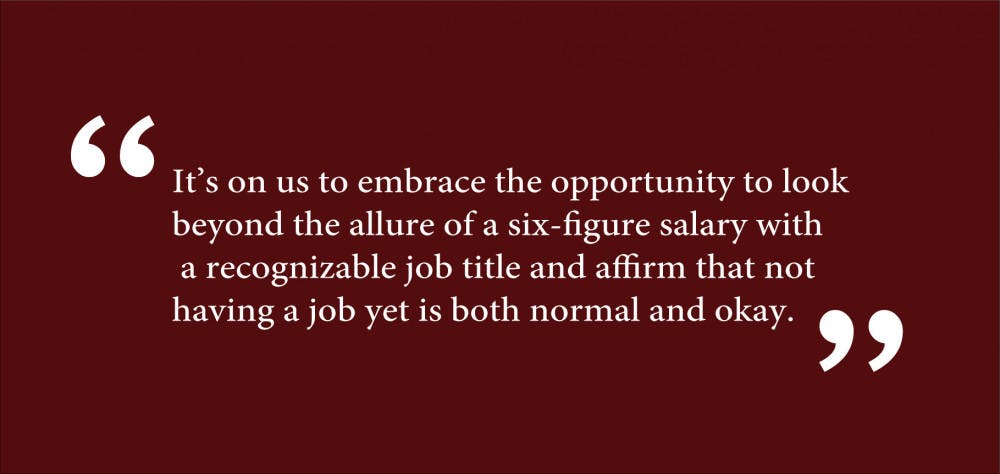I graduate in four months and have no idea what I’m doing next year. As so many fellow ’19-ers know, it is a terrifying feeling. The comfort and regularity of college life are rapidly giving way to an impending unknown where the only certainties are skyrocketing rents and more expensive access to the New York Times. Instead of being ghosted by that cute classmate you asked out, you’re now getting the brush from HR departments worldwide.
In this climate, Brown seniors’ common refrain is to lament that they’ll never get a job. Jokes and memes about our nebulous employment prospects abound. Students (like myself) avoid questions about their post-grad plans with abandon, posturing a resignation to live at home.
But this posturing, while perhaps an understandable outlet for graduation-induced anxiety, to me reflects an ignorance of the privilege our Brown education affords. It’s scary to not know what life holds after May. Still, we’re about to graduate from a super-elite university. While it’s important to recognize that not every student has the same background and career network, there’s every indication that a job will turn up sooner rather than later for most of us. So when someone asks you what you’re doing next year, resist the temptation to complain about how hard it is to secure gainful employment. Finding work is stressful and difficult and, for many people, has serious financial consequences. But it doesn’t serve anyone well to make a public performance of unemployability, especially when for most Brown students, such a jobless fate most likely won’t be the case.
Statistics illustrate that some of our fears might not be wholly rational. Around 91 percent of Brown graduates each year immediately enter the workforce or graduate school. You might be in that 9 percent, but there’s a 91 percent chance you’re not. Although the Open Curriculum has allowed me to evade math courses, I’m still pretty sure 91 is greater than 9. While this data doesn’t reflect every individual’s experience, it does present a comforting picture for most of us.
Moreover, the national unemployment rate is 3.9 percent. Ninety percent of jobs created in the last year went to people who have graduated college. A report from the Georgetown Public Policy Institute found that by 2020, there will be five million more jobs requiring a college degree than there will be workers to fill them.
So as a college graduate, despite what your uncle who laughs at your classics degree might tell you, you are in an enviable position in the job market. That doesn’t even account for the fact that you’ll graduate from a prestigious university with high graduate earnings into a world where the name on your diploma can take you far.
None of these numbers will make a job magically appear for you. And getting a job is still a stressful, consequential endeavor, especially for people who can’t rely on their economic privilege to weather a stretch of unemployment. But the data should be a reminder that something will very likely materialize. Pretending that isn’t true is an insult to those navigating the labor market without the signaling power and vast network that our fancy-sounding degree carries.
Some people might respond, “Yeah, I know I could get some job, but not a good one in the field I want to work in.” To that I’d say, true! That’s precisely the distortion caused by the elite college bubble we inhabit. Our expectations for a good first job are skewed by the rare offers obtained by our friends from Goldman and McKinsey. The social pressure to be elite makes it seem like you need a fancy title to make a difference. And the Brown bubble can make many of us forget that most people need a job to put dinner on the table, not to begin shaping the world in their image as 22 year-olds.
Uncertainty is always part of the job search. But attending Brown acts as a big hedge against that uncertainty. When we complain about how hard it is for us to get work, we minimize the much more significant challenges faced by people who didn’t have the privilege to attend college, let alone an elite one.
By complaining, we also treat the job search as a burden, letting our fears drive a negative attitude. Instead of acting like we won’t get jobs and letting uncertainty make graduation stressful, I think we should acknowledge our position’s advantage and embrace the potential for growth this uncertainty provides.
So, don’t think of finding a job you love as an entitlement or as a box to check that makes your expensive education worth it. Instead, work to see the job search as an opportunity to bring the values you’ve learned at Brown outside the college bubble. That search might be more erratic than the safe, regimented path many students took to get to Brown.
But it’s on us to embrace the opportunity to look beyond the allure of a six-figure salary with a recognizable job title and affirm that not having a job yet is both normal and okay. With that mindset, we will eventually find work we’ll be proud to do and share.
Aidan Calvelli ’19 can only be reached for comment if you offer him a job. For employment opportunities, please email aidan_calvelli@brown.edu. Please send responses to this opinion to letters@browndailyherald.com and op-eds to opinions@browndailyherald.com.





